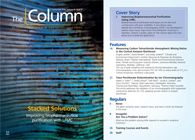CASSS Autobiography Series
What are the motivations and events that drive a successful separation scientist? This is the question that CASSS seeks to answer by documenting the lives and careers of the analytical chemists who have won their “Outstanding Achievements in Separation Science” Award.
Photo Credit: Afrijal Dahrin / EyeEm/Getty Images

What are the motivations and events that drive a successful separation scientist? This is the question that CASSS seeks to answer by documenting the lives and careers of the analytical chemists who have won their “Outstanding Achievements in Separation Science” Award.
Scientists are often not regarded as celebrities. Their personalities aren’t all that important, only the research they undertake and the results they publish. But for Frank Svec, President of CASSS, and Lloyd Snyder, an early awardee, there is merit in documenting the personalities and stories surrounding famous separation scientists.
“Stories about successful careers are usually interesting, especially to those working in the same area,” said Frank. “Such accounts serve as guides or lessons for other practitioners, when they describe how successes were achieved, or how failures were overcome.”
Introduced in 1995, the prestigious CASSS Award for “Outstanding Achievements in Separation Science” has a winner’s list that reads like a “who’s who” of analytical chemists. But beyond the award, the details of the winners’ contributions to separation science are being lost to time.
“A few years back, when my research career was approaching its end, I began to reflect on my own past work in chromatography. There were a number of intriguing episodes - some somewhat humorous - and I began to write them down. Eventually a story of my entire career began to emerge, which I shared with several of my colleagues. Some interest was expressed, and at this point I began to think about encouraging others to prepare similar histories,” explained Lloyd Snyder.
Several autobiographies have already been published on the CASSS website and many more are currently being prepared.
“Although our primary targets are the winners, we do not want to restrict these efforts only on them. There are so many excellent separation scientists among us who may not be the award winners simply because the competition is really fierce. However, they also do excellent research and knowing more about their life might be just as interesting. This is why we plan to post bios of other scientists as well. And obviously, we will add a new winner each year to come,” said Frank. - L.B.
For more information and to read the biographies please visit: www.casss.org/page/BIOINTRO

Evaluating Body Odor Sampling Phases Prior to Analysis
April 23rd 2025Researchers leveraged the advantages of thermodesorption, followed by comprehensive two-dimensional gas chromatography coupled to time-of-flight mass spectrometry (GC×GC/TOF-MS), to compare and assess a variety of sampling phases for body odor.

.png&w=3840&q=75)

.png&w=3840&q=75)



.png&w=3840&q=75)



.png&w=3840&q=75)









